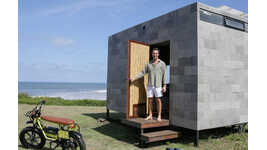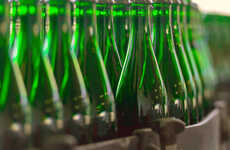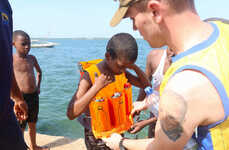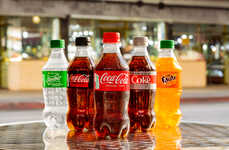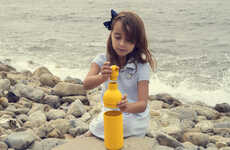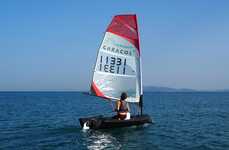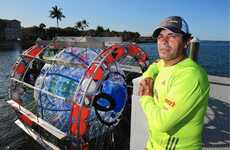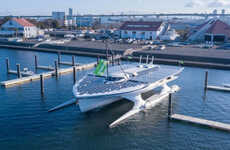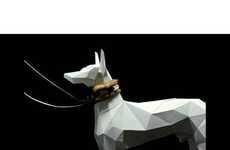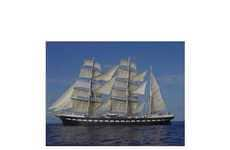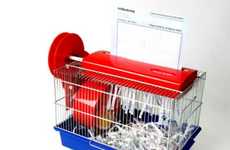
‘Plastiki' Stays Afloat With 12,000 Plastic Bottles
Alexandra Choli — March 31, 2009 — Eco
References: adventureecology & marinebuzz
A gigantic boost to recycled products, Plastiki is a 60-foot catamaran made buoyant with 12,000 two-liter plastic bottles along its hull with the plans to carry its creator, David de Rothschild, across the Pacific Ocean.
According to Adventure Ecology, 7 billion kilograms of plastic are produced annually in the U.S., but only 1 half a billion are recycled, with the rest ending up floating at sea. Now they can do so, but with a purpose: to form a rudderless boat and cover an impressive distance of 11,000 miles, sailing from San Francisco to Sydney. And at the end of this unbelievable journey, the vessel will be victoriously broken down and recycled, of course, providing emergency shelters, shipping pellets, clothes, and even more bottles.
The architect and skipper of the PET-inspired catamaran is explorer, environmentalist and British celebrity David de Rothschild, the heir to one of the world’s greatest banking fortunes. The 30-year-old visionary aims to demonstrate the amazing and impossible things that we can generate through recycling. At the same time, he will be highlighting what happens when we don’t, by drawing on a number of environmental problems along with a crew of filmmakers and scientists.
De Rothschild will be navigating through a man-made tragedy called the Eastern Pacific Garbage Patch, a shocking floating landfill located between California and Hawaii that is twice the size of Texas. The trick up his sleeve is a series of sustainable technologies that will be furnishing his 90% recycled Plastiki, including a deckside vegetable garden as well as solar and wind power generators.
The hardly avid sailor reportedly admits freely to his shortcomings: “I get seasick in the bathtub,” says environmentalist David de Rothschild, and yet he seems admirably fearless and carefree in the face of the most outrageous of expeditions. “But, really, how hard can it be?”
More information and photos at National Geographic Adventure 1 | 2
According to Adventure Ecology, 7 billion kilograms of plastic are produced annually in the U.S., but only 1 half a billion are recycled, with the rest ending up floating at sea. Now they can do so, but with a purpose: to form a rudderless boat and cover an impressive distance of 11,000 miles, sailing from San Francisco to Sydney. And at the end of this unbelievable journey, the vessel will be victoriously broken down and recycled, of course, providing emergency shelters, shipping pellets, clothes, and even more bottles.
The architect and skipper of the PET-inspired catamaran is explorer, environmentalist and British celebrity David de Rothschild, the heir to one of the world’s greatest banking fortunes. The 30-year-old visionary aims to demonstrate the amazing and impossible things that we can generate through recycling. At the same time, he will be highlighting what happens when we don’t, by drawing on a number of environmental problems along with a crew of filmmakers and scientists.
De Rothschild will be navigating through a man-made tragedy called the Eastern Pacific Garbage Patch, a shocking floating landfill located between California and Hawaii that is twice the size of Texas. The trick up his sleeve is a series of sustainable technologies that will be furnishing his 90% recycled Plastiki, including a deckside vegetable garden as well as solar and wind power generators.
The hardly avid sailor reportedly admits freely to his shortcomings: “I get seasick in the bathtub,” says environmentalist David de Rothschild, and yet he seems admirably fearless and carefree in the face of the most outrageous of expeditions. “But, really, how hard can it be?”
More information and photos at National Geographic Adventure 1 | 2
Trend Themes
1. Recycled Products - The use of recycled materials, like plastic bottles, in innovative ways, such as building catamarans, presents opportunities for businesses to create sustainable and eco-friendly products.
2. Sustainable Technologies - The integration of sustainable technologies, such as solar and wind power generators, in marine vessels like the Plastiki, opens up possibilities for businesses to develop and commercialize environmentally-friendly solutions for the maritime industry.
3. Environmental Awareness - The Plastiki expedition raises awareness about environmental issues, particularly plastic pollution in oceans, and creates opportunities for businesses to develop and promote environmentally-conscious practices and products.
Industry Implications
1. Recycling - The Plastiki catamaran demonstrates the potential for using recycled materials in new and creative ways, encouraging innovation and growth in the recycling industry.
2. Maritime - The Plastiki showcases the use of sustainable technologies in maritime vessels, providing a platform for businesses to explore and develop eco-friendly solutions for the maritime industry.
3. Environmental Activism - The Plastiki expedition promotes environmental awareness and encourages businesses to support and engage in sustainable practices, creating opportunities for collaborations and initiatives within the environmental activism industry.
5.3
Score
Popularity
Activity
Freshness

